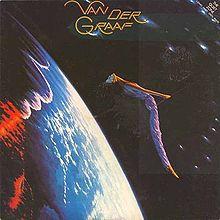The Least We Can Do Is Wave To Each Other - Van der Graaf Generator
$ 0.99 – $ 1.99
Peter Hammill has always had an abiding interest, it seems, in the blurred boundary between the mystical and the scientific, and between the rational and magical mind; this is certainly evident on the debut Van Der Graaf Generator album, even though Hammill had yet to really begin focusing himself on what it was that was driving him (despite the fact that the band's very name referenced a device that resembles a bastard mix of scientific apparatus and shamanic totem).
The Least We Can Do brings those concerns to the fore with ferocity, with time out for a couple of more personal pieces ("Refugees" and "Out of Our Book").
Hammill's lyrics, delivered with all the passion and intent he can muster, reference mysticism, numerology, astrology, various religious pantheons, the Malleus Maleficarum (leading Hammill to conclude, a bit too hopefully, that magic needs to be gray to be balanced), Robert van deGraaf himself (in "Whatever Would Robert Have Said?"), the future of humanity, and surviving ecological catastrophe.
This being the start of the 1970s, the hopeful notes are drowned out by the tidal wave of fear, sadness, and despair, despite which, the music does tend to be rather uplifting, thanks to the undercurrent of barely restrained majesty VDGG tended to have (possibly thanks to Hugh Banton, who had been rather used to communicating with God via church and cathedral organs; he brought that expertise to a position more normally occupied by determined B3 thumpers engaged in battle with show-horse guitarists).
The main thing that The Least We Can Do is in need of now is a good remastering job (and the addition of a few leftover tracks, such as the "Refugees" single version and its B-side.) [The Virgin CD transfer is a lazy example of taking an album master and making a CD master from it, leaving the album lacking dynamic range and sounding a bit muffled.].
| Title/Composers | Performer | Listen | Time | Size | Size | |
|---|---|---|---|---|---|---|
| 1 | White HammerPeter Hammill | Van der Graaf Generator | Play | 08:15 | 18 MB | 42 MB |
| 2 | Whatever Would Robert Have Said?Peter Hammill | Van der Graaf Generator | Play | 06:07 | 14 MB | 30 MB |
| 3 | Out of My BookPeter Hammill, David Jackson | Van der Graaf Generator | Play | 04:07 | 9 MB | 22 MB |
| 18 mins | 42 MB | |||||
| 18 mins | 95 MB | |||||
| Artist | Job | |
|---|---|---|
| 1 | John Anthony | Producer |
| 2 | Hugh Banton | Bass, Guitar, Keyboards |
| 3 | Rob Cable | Engineer |
| 4 | Guy Evans | Drums |
| 5 | Peter Hammill | Composer, Guitar, Keyboards, Piano, Vocals |
| 6 | Michael Hurwitz | Cello |
| 7 | David Jackson | Composer, Keyboards, Wind |
| 8 | Nic Potter | Bass |
| 9 | Jerry Salisbury | Horn |
| 10 | Van der Graaf Generator | Primary Artist |
Van der Graaf Generator
| Quality | Format | Encoding | Description |
|---|---|---|---|
| Standard | MP3 | 320kps 44.1kHz | MP3 is an audio coding format which uses a form of lossy data compression. The highest bitrate of this format is 320kbps (kbit/s). MP3 Digital audio takes less amount of space (up to 90% reduction in size) and the quality is not as good as the original one. |
| CD Quality | FLAC | 16bit 44.1kHz | FLAC is an audio coding format which uses lossless compression. Digital audio in FLAC format has a smaller size and retains the same quality of the original Compact Disc (CD). |







